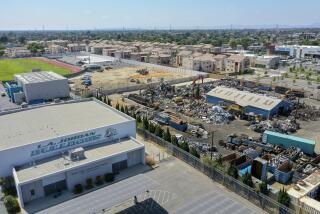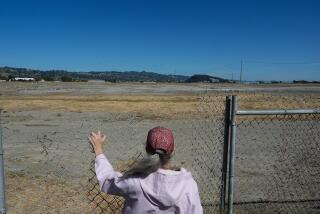Peace Brings Conflict to Workers at Rocky Flats : Defense: Cold War’s end is eliminating jobs at the nuclear weapons plant. After years of service, employees say they feel betrayed by government.
- Share via
ROCKY FLATS, Colo. — For 38 years, Rocky Flats was what the fight against communism was all about.
Born when the United States was at war in Korea, raised in the era of Cold War, the super-secret defense plant on Denver’s doorstep came to symbolize both the benefits and potential horrors of achieving nuclear superiority.
The “flats people,” as employees were called, considered themselves almost missionaries. Building the triggers for nuclear weapons, surrounded by the hazards of radioactive plutonium, derided by anti-nuclear activists who protested daily for years, many believed they were true patriots, keeping America strong in a world threatened by the Red menace.
It was a mission that seemed permanent. Then, with bewildering speed, the Soviet Union collapsed, President Bush canceled plans to build a new nuclear warhead and the Department of Energy announced, in January, a permanent shutdown of all plutonium manufacturing.
Rocky Flats had become a victim of the peace dividend. By year’s end, 1,500 of the 8,000 jobs at the facility will be eliminated, and 2,600 more will be lost by 1995.
On top of that, on Thursday it was announced that Rockwell International Corp., the facility’s prime contractor from 1975 to 1989, had reached a negotiated settlement with the federal government and pleaded guilty to charges of illegally disposing of radioactive wastes.
Critics saw the announcement as confirmation that operations at the plant were dangerous and carried out with little regard for the environment.
Peace activists in Denver popped champagne corks when the Energy Department made Rocky Flat’s mission obsolete last January. Said Tom Rauch, director of the Rocky Flats Disarmament Project: “For the first time in 50 years, the United States is not producing a new nuclear warhead. That’s as significant as the fall of the Berlin Wall. . . .”
But the government’s action has left many workers resentful and believing their jobs were sacrificed to the political whims of the moment.
In the United Steelworkers of America union hall, beneath a banner that says, “Saddam Hussein Still has a Job. Do You?” Jim Kelly, a 35-year veteran of the plant, tries to find words to express the sense of shock and betrayal he feels.
Now that the world has grown safer, where are the thanks for the “flats people” who helped make it that way, he asks. Do you thank them by taking away their jobs and simply putting them out to pasture?
“Who did I blame?” Kelly asked. “The politicians and the environmentalists. The political delegation listened to the environmentalists and the peace groups, and they became obsessed with what they heard. Particularly (Colorado’s Democratic Rep. David E.) Skaggs. He even said he didn’t want a (plutonium-processing) Rocky Flats in his back yard.”
“Yes,” Rep. Skaggs said in a telephone interview. “I think a persistent effort by certain members of the congressional delegation--me included--to hold (the Department of Energy) accountable for slipshod practices at the plant over many, many years was a contributing factor (in Rocky Flats’ downsizing). But this wasn’t simply a trumped-up issue by politicians. Blame goes with DOE and the contractors who have run that plant in a lousy way over decades.
“Of what was Rocky Flats a victim? It was a victim of the grace of God that has delivered this world from the edge of nuclear disaster.”
There is no consensus at Rocky Flats or in the suburban towns nearby about whether the facility posed a significant danger, even though Rockwell, in its settlement, admitted discharging toxic wastes into water that fed the local drinking supply.
Ask electrician Clayton Himes if he drinks the water in Rocky Flats and he’ll say, sure, it’s better than Denver’s.
But Broomfield, Colo., a city of 27,000 that gets 51% of the runoff from the Rocky Flats plant, is designing a new water-delivery system because very low levels of plutonium contamination from fallout were found in a pond that is part of the existing water system.
“When I first got in the field, I used to have dreams at night of becoming seriously contaminated, and then after a while that sort of normal layman’s fear went away,” chemist Gary Thompson, president of Citizens Against Nuclear Disinformation, said in an interview last week. “Now I feel much safer working at Rocky Flats than I would driving to and from downtown Denver every day. Personally, I think the activists overstated the danger of the plant.
“As long as we live in an imperfect world, I feel that military force is a necessity if you are going to survive. Our victory (in the Cold War) came about because of the resolution of the American people not to let communism take over the world. We were willing to spend the blood and the money. It didn’t come about because there were protesters who dressed up like pigs and danced around out at Rocky Flats.”
How, some workers ask, could a plant that was once considered critical to U.S. security suddenly be declared worthless? Who should take the blame for the eventual loss of 4,100 jobs in an economy already jittery over the closing, coming in 1994, of nearby Lowry Air Force Base, which has a civilian and military payroll of 10,300?
There was, though, much to suggest that Rocky Flats was courting an environmental disaster. In 1989, plutonium processing was suspended temporarily--permanently as it turned out--to perform maintenance and to review safety problems. Five months later, the FBI raided the facility in search of evidence of environmental crimes.
A grand jury in Denver was convened. During the past 32 months, it has heard allegations of wrongdoing. Rockwell and the plant’s current operator, EG&G; Inc., a Wellesley, Mass., engineering firm, were served with at least 46 subpoenas. The grand jury investigation led to Rockwell’s settlement with the government.
The environmental concerns at Rocky Flats were many:
--Sixty-two pounds of plutonium had built up inside a mile of factory ducts.
--At least eight trenches held buried drums contaminated with uranium and plutonium.
--More than 100 sites contained pollution that had been spilled or dumped.
--The facility was considered by the government to be one of the nation’s worst toxic waste sites, and scientists estimated that a cleanup would take a decade and cost between $1 billion and $3 billion.
In March, 1951, Rocky Flats, a plateau 16 miles northwest of Denver, was chosen from 35 sites to be the Atomic Energy Commission’s newest production plant.
Its primary mission was to smelt, purify and fashion plutonium--a toxic, combustible and radioactive metal--into “pits,” an essential component in triggering an atomic blast that in turn sets off a hydrogen explosion. So much secrecy descended over Rocky Flats after it opened that even German shepherd guard dogs had security clearances.
Not until 1956, three years after the plant went on line, did the AEC reveal that the facility was involved in the production of weapons. And not until 1957, when two workers were injured in an explosion, did it reveal that plutonium was a key material used at Rocky Flats.
Rocky Flats, owned by the Energy Department, which replaced the AEC, and operated by a succession of contractors--first Dow Chemical Co., then Rockwell, and since 1989, EG&G--became; a key target of anti-nuclear activists in the late 1970s. They held vigils and protests on an almost daily basis and sometimes were arrested by the scores.
Once the cleanup is completed, Rocky Flats may close down. In order to reduce stockpiles of nuclear weapons and save money, the Energy Department is consolidating production and wants to move Rocky Flats’ non-nuclear operations to other plants.
Many Coloradans would like to see Rocky Flats remain active in non-nuclear missions, such as the production of stainless steel. But they realize that the controversy of recent years has probably sealed the plant’s fate.
“Other cities are standing in line begging for our work, and they think we’re fools,” said Alan Aluisi, who has worked at Rocky Flats for three years. “They say: ‘Sure, we’ll take a billion-dollar operation off your hands.’ ”
Researcher Ann Rovin in Denver contributed to this story.
More to Read
Sign up for Essential California
The most important California stories and recommendations in your inbox every morning.
You may occasionally receive promotional content from the Los Angeles Times.













